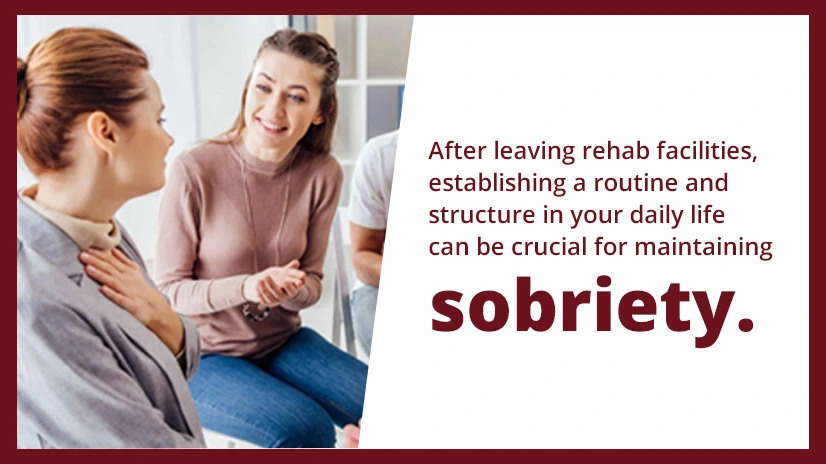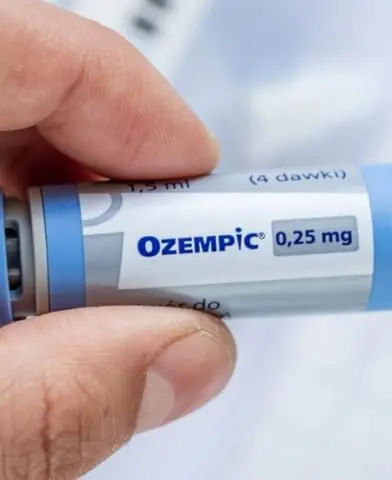
After Rehab: Effective Recovery Strategies
Clinically Reviewed by:
After completing a rehabilitation program, individuals face a crucial transition period that can significantly impact their recovery. This phase, often referred to as “aftercare,” involves ongoing support and strategies to help maintain sobriety and prevent relapse.
After rehab, individuals may participate in various aftercare programs, such as outpatient therapy, support groups, and sober living environments. These programs provide essential tools and guidance to help individuals navigate challenges and build a healthy, fulfilling life without substances.

Key Takeaways
Transitioning into the post-rehab phase after addiction recovery poses specific challenges. Here is what you need to know:
- Continued support through therapy and support groups is crucial for maintaining sobriety after rehab.
- Healthy habits and routines can help individuals navigate life post-rehab without relying on substances.
- Building a strong support network of friends, family, and peers who understand and support recovery is essential for long-term success.
If you or your loved one is dealing with addiction, then trust Indiana Center for Recovery for expert aftercare. Call us at (844) 6500064 to learn more about our services.
What Happens Immediately After Rehab?
Immediately after completing a rehabilitation program, individuals typically transition into what is known as the “post-rehabilitation” phase. This phase is crucial for maintaining the progress made during rehab and integrating into daily life.
Here’s what commonly happens:
The First 24 Hours After Rehab
The initial hours post-rehab is crucial. Emotions might swing wildly, ranging from relief to anxiety. Reintegration into normal life can feel challenging. It’s common to experience a mix of excitement and apprehension. Practical challenges like re-establishing routines and reconnecting with loved ones may arise. Developing a support network is essential during this time.
The Initial Emotional And Physical Challenges
Emotionally, adjusting to life outside rehab can be challenging. You might feel vulnerable, facing triggers absent in a controlled environment. Dealing with cravings or old habits may test your resolve. Physically, your body may still be adjusting to sobriety, with lingering withdrawal symptoms.
Taking it one step at a time and staying committed to your recovery journey can help you navigate these challenges.
Coping With Post-acute Withdrawal Syndrome (PAWS)
PAWS typically refers to a set of symptoms that appear after the acute withdrawal phase of substance use has passed. These symptoms can sustain for weeks, months, or even years after someone stops drug use and alcohol consumption.
Here are some strategies to help cope with PAWS:
Understanding The Symptoms Of PAWS
PAWS is more common in individuals who have a history of heavy or prolonged substance abuse, particularly alcohol, opioids, benzodiazepines, or other drugs.
Symptoms can vary widely among individuals but may include:
- Mood swings: Fluctuations in mood, including depression, anxiety, irritability.
- Anhedonia: Reduced ability to experience pleasure or interest in activities.
- Sleep disturbances: Insomnia, hypersomnia, vivid dreams, nightmares.
- Cognitive difficulties: Trouble concentrating, memory problems, impaired decision-making.
- Physical symptoms: Headaches, dizziness, fatigue, gastrointestinal issues.
- Cravings: Intense desire for the substance of abuse.
- Increased stress sensitivity: Heightened response to stressors, leading to anxiety.
- Social withdrawal: Isolation from friends, family, or social activities.
- Impaired impulse control: Difficulty regulating emotions, leading to impulsive behavior.
Remember, these symptoms can vary in severity and duration from person to person. If experiencing PAWS symptoms, seeking professional support is advisable.
Tips For Managing PAWS
Stay Connected: Surround yourself with supportive friends and family who understand what you’re going through. Their encouragement can make a world of difference.
Healthy Habits: Focus on eating well, physical exercises, and getting enough sleep. Taking care of your body can help stabilize your mood and energy levels.
Mindfulness And Relaxation: Practice relaxation techniques like deep breathing, meditation, or yoga to calm your mind and body during tough moments.
Set Realistic Goals: Break down your tasks into smaller, achievable steps. Celebrate each accomplishment, no matter how small, to boost your confidence.
Seek Professional Help: Don’t hesitate to contact a therapist or healthcare professional for extra support. They can provide coping strategies and guidance tailored to your needs.
Avoid Triggers: Identify and avoid situations, people, or places that tempt you to use again. Instead, utilize your time with activities that bring you joy and fulfillment.
Stay Patient: Remember, PAWS doesn’t last forever. Be patient with yourself and trust that things will get better with time.
Celebrate Progress: Reflect on how far you’ve come since the beginning of your recovery journey. Recognize and celebrate your achievements, no matter how small they may seem.
By implementing these strategies and staying committed to your long-term recovery, you can navigate PAWS with resilience and emerge stronger on the other side.
The Ongoing Journey Of Recovery
The ongoing journey of recovery condenses the enduring process of healing and growth following a challenging experience, such as addiction, trauma, illness, or loss. Recovery is not a linear path but a dynamic, ongoing process marked by progress, setbacks, and resilience.
The Role Of Outpatient Programs
Unlike residential programs, outpatient programs allow individuals to receive treatment while managing their daily routines. These programs offer flexibility, enabling people to attend therapy sessions or group meetings without disrupting work or school commitments.
They provide essential support and guidance, offering coping strategies and tools to navigate life’s challenges while on the path to recovery.
The Value Of Counseling And Psychotherapy
Counseling and psychotherapy are invaluable components of drug treatment. These sessions allow individuals to explore their thoughts, feelings, and behaviors in a safe and supportive environment. Therapists offer personalized guidance, helping patients understand the root causes of their struggles and develop effective coping mechanisms.
Incorporating A Healthy Lifestyle And Self-Care
In recovery, embracing a healthy lifestyle and practicing self-care is fundamental. This involves nurturing the body, mind, and spirit through regular exercise, balanced nutrition, and sufficient sleep.
Self-care encompasses engaging in hobbies, spending time with loved ones, and setting boundaries to protect one’s well-being.
Tools For Staying Sober After Rehab
Staying sober after rehab is a challenging yet essential part of the recovery journey. Fortunately, many tools and strategies can help individuals maintain their sobriety.
Here are some suggestions:
Building A Strong Support Network
A solid support network can make all the difference when working on maintaining sober life after rehab. This means surrounding yourself with people who understand what you’re doing. Your support network could include family members, sober friends, therapists, or support groups.
These are the people you can turn to when you’re feeling tempted or struggling with cravings.
The Role Of 12-Step Programs
Many people find solace and guidance in 12-step programs like Alcoholics Anonymous (AA) or Narcotics Anonymous (NA). These programs provide a structured approach to recovery, emphasizing honesty, acceptance, and personal accountability.
Individuals can find a sense of community and belonging through attending meetings, working the steps, and connecting with a sponsor.
The Importance Of Routine And Structure
After leaving rehab facilities, establishing a routine and structure in your daily life can be crucial for maintaining sobriety. This means setting regular sleep schedules, meal times, exercise routines, and leisure activities.
Having a predictable routine can help you stay focused and avoid boredom or idle time, which can be triggers for relapse. It provides stability and purpose as you navigate life without substances.
Maintaining Focus On Personal Growth
Recovery isn’t just about abstaining from drug addiction or alcohol; it’s also about personal growth and development. You can achieve this through therapy, self-reflection, setting goals, and learning new skills or hobbies.
By focusing on your personal growth, you’re not just avoiding old behaviors but actively building a fulfilling and meaningful life in sobriety.
Managing Relationships After Rehab
Managing relationships after rehab can be challenging, but it’s crucial for maintaining sobriety and building healthy peer support.
Here are some tips for managing relationships post-rehab:
Communicating Your Needs And Boundaries
Expressing your feelings and setting clear boundaries as you navigate life after rehab is crucial. Open, honest communication helps loved ones understand your needs. Share what makes you comfortable or uncomfortable, and be assertive in maintaining your boundaries.
Your well-being comes first, so don’t hesitate to voice your needs respectfully.
Dealing With Stigma
Facing stigma after rehab can be challenging, but remember, it’s not a reflection of your worth. Surround yourself with supportive people who see beyond labels. Educate others about addiction as a disease, not a moral failing.
Focus on your progress and surround yourself with positivity. Over time, you’ll see that overcoming stigma is about others’ ignorance, not your value.
Rebuilding Trust With Loved Ones
Rebuilding trust takes time and effort. Be patient and consistent in your actions, showing loved ones you’re committed to change. Acknowledge past mistakes, but also demonstrate your growth through positive behaviors.
Communication is vital, as is listening to their concerns and reassuring them of your dedication to recovery. Trust is fragile, but with honesty, it can be rebuilt more robustly than before.
Relapse Prevention After Rehab
Relapse prevention is a critical aspect of addiction recovery after completing a rehabilitation program. Recognize the people, places, emotions, and situations that may trigger cravings or risk of relapse.
Here are some strategies that can help individuals maintain their sobriety and prevent relapse:
Relapse As Part Of The Recovery Journey
Relapse can feel like a giant setback, but seeing it as part of the recovery plan is essential. It’s like taking a diversion on a road trip – you might stray off course, but you can always find your way back. Understanding triggers, stressors, and the nature of addiction helps you navigate these bumps in the road with more resilience and understanding.
Learning And Using Strategies To Prevent Relapse
Preventing relapse is all about having a toolkit of strategies to rely on when things get tough. Many tools are available, from avoiding risky situations to building a support network. Learning these strategies and practicing them regularly can strengthen your resolve and make it easier to stay on track with your recovery goals.
The Power Of Positive Visualization And Mindset
Your mindset plays a huge role in your recovery journey. Positive visualization involves imagining yourself succeeding and staying sober, which can boost your confidence and motivation. By focusing on the positive aspects of your voyage and envisioning a bright future, you can reinforce your commitment to sobriety and overcome challenges with resilience and determination.
Frequently Asked Questions (FAQ)
After completing an addiction treatment program, it’s essential to offer support and encouragement to someone who’s just out of drug rehab. Acknowledge their journey in addressing their substance use disorder and commend their commitment to mental health.
Remind them of the importance of continuing with aftercare and staying focused on their recovery. Let them know they’re not alone in their journey towards wellness.
After completing a rehab program or treatment facility for substance abuse:
- Consider transitioning to a sober living environment.
- Engage in ongoing group therapy or support groups to maintain sobriety.
- Incorporate healthy habits into everyday life, like exercise and mindfulness.
Avoid triggers and seek family support to prevent relapse. Stay committed to your recovery journey and prioritize self-care to overcome drug abuse challenges effectively.
Post-rehab, numerous support networks aid in the recovery process. These include outpatient treatment plans, family therapy sessions, and life skills training provided by treatment centers. Residential treatment homes offer a supportive environment.
Engaging with treatment providers, attending group therapy, and incorporating newfound skills into real-world scenarios are pivotal first steps toward sustained recovery.






 100% Confidential
100% Confidential